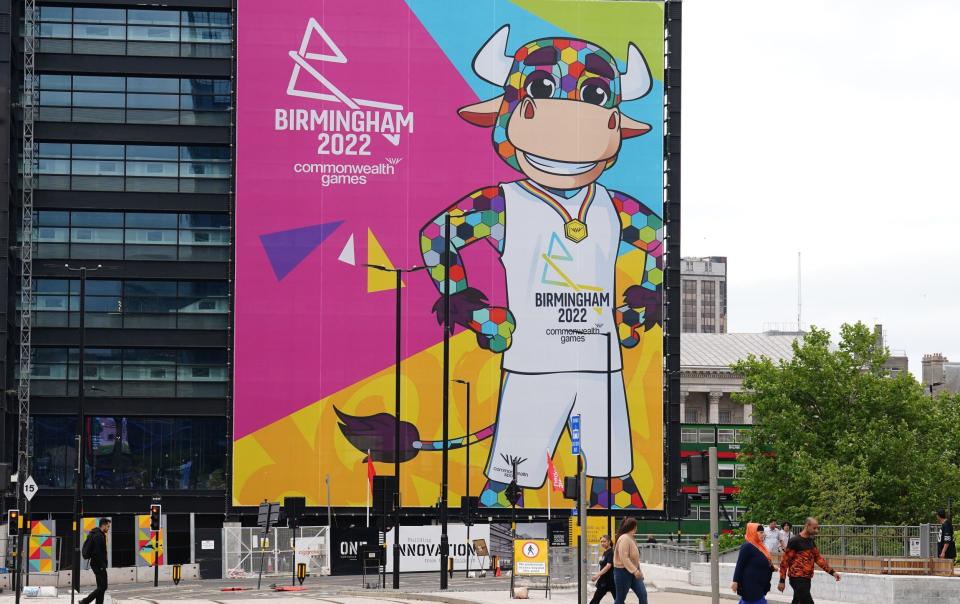In praise of Birmingham, our hidden jewel of a second city

See a forlorn face in Birmingham and within seconds you’ll hear someone attempting to cheer them up with the words: “Did you know this place has more canals than Venice?” It’s a prized piece of knowledge in England’s second city which, as host of the Commonwealth Games, is finally readying for its moment in the sun.
More than a million visitors are expected to descend on the Midlands over the coming weeks, which locals hope will reimagine a mental image mainly comprising an industrial hinterland featuring the Bullring shopping centre, Spaghetti Junction and an accent routinely voted “the least trustworthy in the UK”.
Steven Knight, creator of Peaky Blinders and part of the team behind Thursday’s Opening Ceremony, needs no convincing. Beyond the Brummie burr – which (in spite of its reputation) he describes as “one of the wonders of the world” – there is “so much that the city has offered to the country and to the world... we don’t really bang the drum enough.”
That affection has inspired his paean to his hometown, which he hopes “will be the start of Birmingham having a new image”.
The city has been undergoing a major facelift of late, beginning with the £750 million do-over of its main train station (Grand Central, formerly known as New Street) in 2016. Having successfully wiped out the bizarre clutch of shops connecting it to the Bullring, including the neon-lit tattoo parlour where my student nose was pierced over a decade ago, it only takes a cursory look to see developers are spending big here. HS2 is now a mere decade away, while a handful of Michelin-starred restaurants have popped up between the apartment blocks and overpasses – the second highest number in the UK outside of the capital. Not bad, bab.

Still, Birmingham’s pleasures aren’t new to locals – even if the rest of the world has been slow on the uptake. I was in that Brum-denying cohort until the late Noughties, when I arrived at the university campus expecting a concrete block, and instead found a picturesque scene of manicured greenery and red bricks.
The tour guide’s spiel included the fact that the University of Birmingham is the only academic institution with its own in-built mainline station (University Train Station) – one of many Birmingham firsts, like being the oldest manufacturing town in the world, holding the largest global collection of pre-Raphaelite art, and having more parks than any other European city. It’s produced Ozzy Osbourne and Neville Chamberlain, UB40 and Duran Duran, Julie Walters, Jack Grealish, Richard Hammond, Christine McVie and the Balti Triangle.
Given this glut of cultural titans, why has it remained so roundly besmirched by the rest of the world?

“It’s definitely somewhere in the country that people like to look down on,” says historian Kate Williams. A proud Black Countrywoman, she says she has often been disparaged for her roots, finding it “quite strange” how often Birmingham is mocked, and its second city status denied. Indeed, this is a bugbear for most Brummies, who spend a sizeable portion of their time remonstrating that yes, they hold that title above Manchester or Liverpool. (Good luck winning that argument with a cab driver abroad.) Blame it on the international anonymity of Aston Villa, but Birmingham has long lagged behind the UK’s other hubs, dismissed as a flyover city without the grit of the north, nor charm of the south.
Perhaps this underestimation is how Brummies like it, Knight says of a people who “don’t get too big for their boots”. Actor David Harewood, who grew up in Small Heath (which, according to a one-star TripAdvisor review, is likely to see visitors “stabbed or robbed”), says: “Birmingham people are the salt of the earth. People respond to a certain down- to-earthness that I have, and that’s purely as a result of coming from Birmingham.” Humour is a given, too. “Any occasion, there’s always a reason to have a laugh, which is a real characteristic of Brummie people,” according to Knight.
That’s not to say each area doesn’t have a character of its own. Leafy Edgbaston is easily the most genteel, thanks to its cricket ground and schooling of Malala Yousafzai; Digbeth is the city’s answer to east London – or “like TriBeCa before it became TriBeCa,” Knight says – all warehouse parties and creative installations in what was once the city’s industrial heartland. Young professionals head to Moseley, just south of the centre, for its more upmarket clutch of restaurants and bars, while Selly Oak is a student mecca, inhabited by virtually all early 20somethings, who have spent many days traipsing from the Selly Sausage for a fry-up to the Bristol Pear for a lunchtime pint, then off for a biryani at Dilshad, where you can still eat dinner for under a tenner. Asking around for beloved Brum-based memories, there are several votes for the Selly Sausage (gone but never forgotten), the Botanical Garden, the Custard Factory creative complex and Radio Lollipop, where my mum still fondly remembers chinwagging with Leo Sayer. I left Birmingham a decade ago, but even odd trips back have made their mark: drinking naff cocktails out of a metal bucket with former housemates, my boyfriend declaring undying love as we steamed out of Grand Central, and being stared down by 300 border collies (and Jilly Cooper) at the 2016 iteration of Crufts.

Williams points out that the Birmingham Royal Ballet has flourished since the 2020 appointment of Carlos Acosta, who has promised to make the city “a centre for the arts”. It’s an accolade coming closer into view in recent years, with the Flatpack Film Festival, Ikon Gallery and Uncommon Riches, Birmingham Repertory’s festival this year riffing on the Games. “You could argue that William Shakespeare was a Brummie,” Knight adds, though who has the energy for a culture war in this heat?
Still – with apologies to Simon Le Bon – Knight has presided over the greatest cultural export the city has seen via Peaky Blinders. His tale of gang exploits in 1920s Birmingham has, according to the West Midlands Growth Company, prompted the “Peaky effect”, edging up tourist numbers and transforming the city’s image over the course of its six series. There are themed events and street art tours, drawing in visitors from around the world. At one stage, there was even talk that the Games merchandise would include the show’s trademark flat cap.
“Liverpool had the Beatles, Manchester had football… but Birmingham didn’t have that calling card,” Knight says. “As soon as you say Birmingham [now], people say Peaky Blinders. So that is something new, and we’re hoping to build on that.” There is also a rich “industrial history, a Victorian history, a Civil War history... We’ve got an incredible history”, Williams says of the city. “And hopefully one day, it’ll be on the must-see map of Europe.”
The Games will be a vital tool, she adds – both in replacing memories of Birmingham’s failed 1992 Olympics bid, and cementing the place as a solid citybreak weekender. Just as the London 2012 Olympic Opening Ceremony provided a love letter to the capital as a microcosm of all that made Britain great, on Thursday, Birmingham will write its own, with the world watching.
Not before time. The city has long worn its melting pot status lightly, the migration of the 1950s and 1960s making the place as likely to turn out Black Sabbath as bhangra. The Chinese Quarter popped up a little later; no doubt in coming decades, other groups will make their imprint, too. “Birmingham has reinvented itself many times,” Knight says – and that goes well beyond tower blocks and high-speed rail networks. “The city is the people… and the people endure.”
Off to Birmingham? Here are 10 must-do activities.

 Yahoo News
Yahoo News 